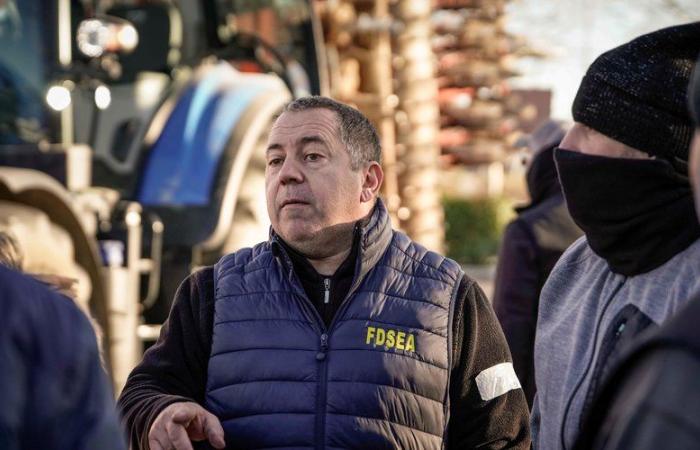
Different farmers' unions in Gard are ready to leave again like last winter to make their demands heard. We are talking about the Mercosur agreements but also the premium for grubbing up vines, farmers in great difficulty, the use of phytosanitary products and insurance for agricultural calamities before the mobilization on Monday, November 18.
Agricultural unions are ready to mobilize again after the anger which spilled over last winter, particularly in Gard. The FDSEA and the Young Farmers of Gard are already announcing an action on Monday, November 18 in the evening, the “nice” operation.
David Sève (FDSEA du Gard)
Figure of last winter's agricultural protest on the A9 motorway near the Nîmes west interchange, the president of the FDSEA du Gard David Sève is ready to return to the field on Monday November 18 with, under his belt, the demands of his union: “At the national level, there are 120. I have identified fifteen very important ones among them. And I add to that the Mercosur agreements and the problem of Bluetongue. For us, it is a casus belli.”
David Sève is very concerned about the current state of mind of the department's operators. “Last winter, there was anger but this is despair and it is much more serious. We have a lot of doubts about the public word given. There are measures which do not require funding but just political will.” The Beaucaire arborist, who titled Monday evening's operation “nice”, wants to remind the public authorities of four demands on which he will not compromise.
He mentions the premiums for uprooting vines which must be tax-exempt for those who retire. “as dignified as possible. What's the point if they lose half the price”. David Sève highlights phytosanitary products whose use is increasingly restricted “without having substitute products. We are losing part of our harvests with the new parasites favored by climate change and global trade. I remind you that France has lost half of its cherry orchard in five years.”
The FDSEA of Gard wants the establishment of a commission to support the farmers most in difficulty with tax and banking measures. She wants a review of the new insurance system for agricultural disasters which endangers agricultural activity. So many issues that should be highlighted from November 18.
Romain Angelras (Young farmers of Gard)
Midi Libre – MIKAËL ANISSET
President of the Young Farmers of Gard and winegrower in Costières de Nîmes, Romain Angelras likes to recall the slogan which will dictate agricultural actions this fall: “You don’t cash in until we cash in.” He himself is losing patience even if he advocates responsible demonstrations without excess.
However, he sees clearly that things are not moving or at least not fast enough compared to what was promised after the first crisis at the beginning of the year: “Since the crisis last winter, there have been many announcements that have not been made. Discontent is growing again. […] We are experiencing a crisis unprecedented in its scale. We don’t see a loss of support. There has been an explosion in expenses which put us in even more difficulty, particularly in terms of profitability. We really had a complicated year for treatments.”
Romain Angelras relies on the State to change the situation, wants there to also be recognition of the specificities of Gard with very diverse cultures depending on the sector, from the coast to the Cévennes. “The anger is enormous today. When we talk about action, the state is clearly targeted.”
Didier Doux (Rural Coordination of Gard)
At the head of the Gard Rural Coordination, Didier Doux, cereal grower in Les Angles, announces throughout France a mobilization of his union in front of the prefectures and sub-prefectures from Tuesday November 19. He denounces the products “who arrive from abroad and who do not come from the same agriculture as ours”that is to say without the same constraints. He recognizes that the mobilizations of last winter made it possible “the absence of a tax on non-road diesel. But apart from that, not much has changed since then. There are still so many standards, texts that make it difficult for us to life. We don't listen to the logic of farmers.” The famous peasant common sense.
Didier Doux is ready to mobilize again, aware of the great difficulties encountered by the wine sector: “For a couple of years, wine has been selling with great difficulty while many foreign wine products have been brought in. I can tell you that there are cellars on the verge of bankruptcy in the Gard with full vats. It’s particularly complicated for the Côtes-du-Rhône.”
Didier Marion (Peasant Confederation of Gard): “Away from total free trade”
The FNSEA is sounding the alarm and recommending new actions, ten months after the major motorway occupation movement. What does the Conf' say?
We must come together to organize actions too. The movement in January was launched by the Rural Coordination and the FNSEA clung to the branches to save the system. We are leaving with the same race to the willow, as the professional elections approach (January 31, 2025, Editor's note).
What is the situation, in your opinion, ten months after the vast protest movement in the agricultural world?
The situation is worse than last year. Whatever the sectors, it is difficult. Except for very large farms like in Beauce…
What got worse?
The free trade agreement for milk (with New Zealand, which entered into force in the spring, editor's note), not denounced by the FNSEA, is catastrophic. Lactalis will be able to rain or shine and we will lose our last dairy producers. At the wine level, there is terrible distress, with cellars that have stopped paying. Roughly speaking, we produce 40 million hectoliters in France, for a consumption of 21 or 22. Something is not working. And the Rural Coordination does not want any uprooting!
What do you recommend?
Strong measures are needed, with support to allow farmers to diversify. We must also move away from total free trade, by establishing a minimum price of entry into the territory. What the farmer receives must allow him to cover the cost price, earn a salary and obtain social protection. Currently, the prices charged do not allow this. We need regulation of production and markets.
Comments collected by Adrien Boudet





